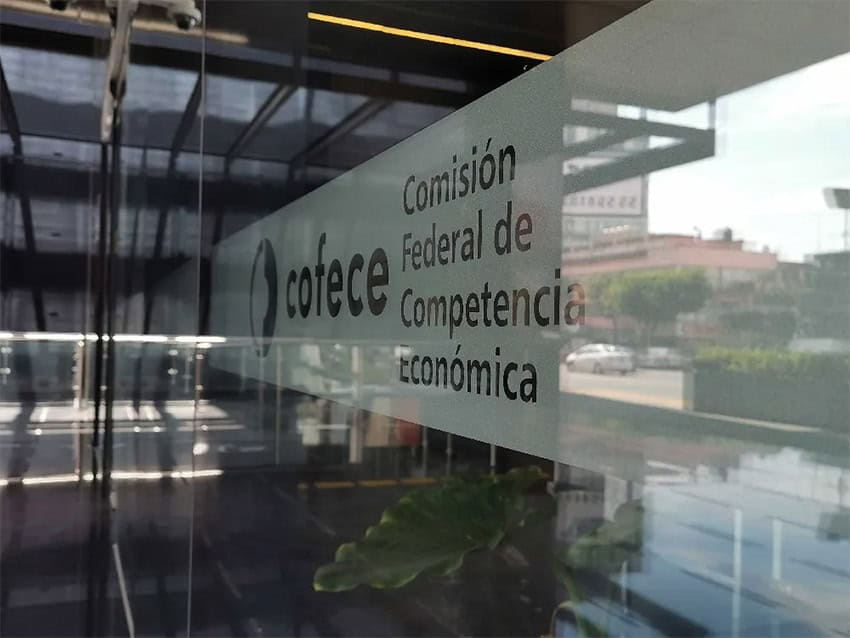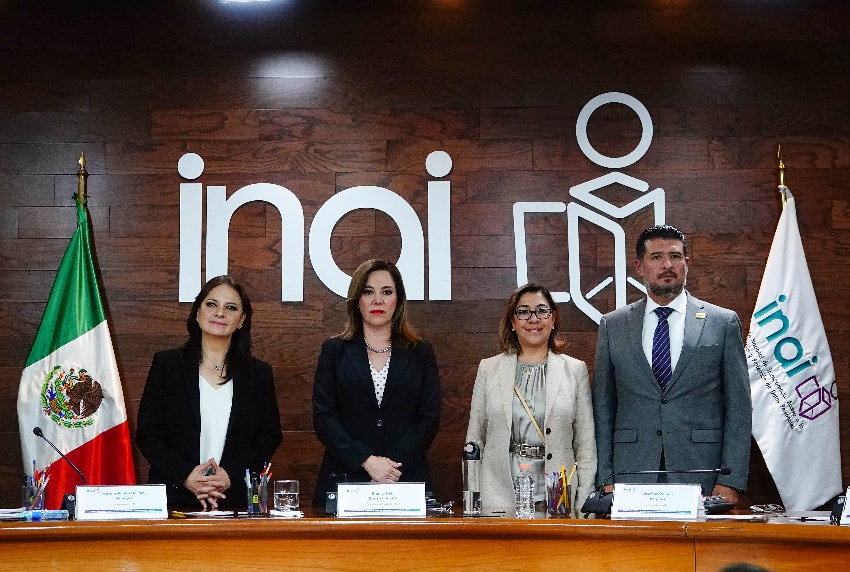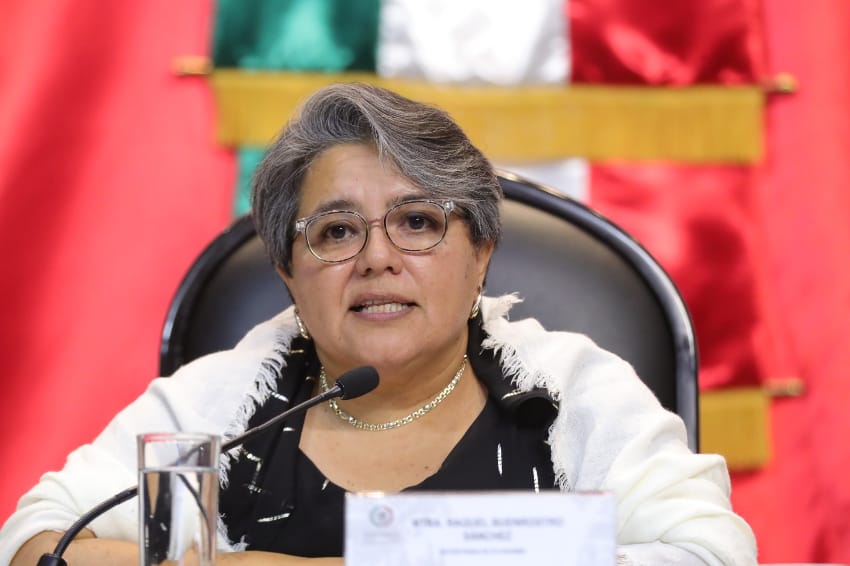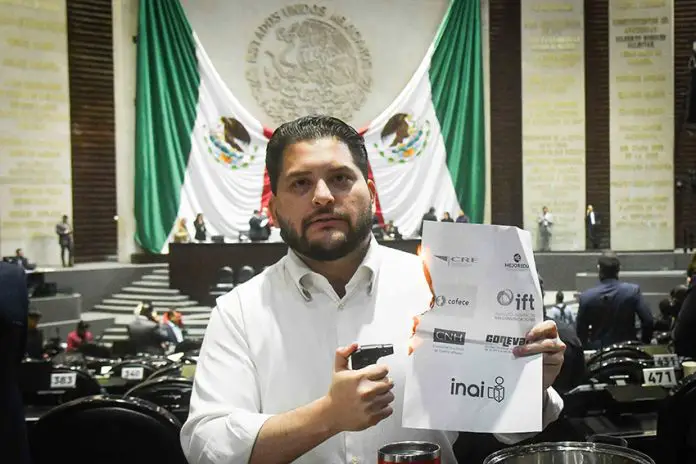The Senate on Thursday approved a controversial constitutional bill that seeks to eliminate seven watchdog agencies including the national transparency agency.
Senators with the ruling Morena party and its allies voted in favor of the bill, while opposition lawmakers opposed it.

The final count was 86 votes in favor — exactly the number needed to reach the two-thirds majority required to approve constitutional bills — and 42 against.
The bill, sent to Congress in February by former president Andrés Manuel López Obrador, was approved by the Chamber of Deputies last week.
Mexico’s 32 state legislatures — most of which are controlled by Morena — will now consider the constitutional reform proposal. If a majority approve it, President Claudia Sheinbaum can sign the bill into law.
If that occurs, the following seven autonomous agencies will be disbanded:
- The National Institute for Transparency, Access to Information and the Protection of Personal Data (INAI).
- The Federal Economic Competition Commission (Cofece).
- The Federal Telecommunications Institute (IFT).
- The National Council for the Evaluation of Social Development Policy (Coneval).
- The Energy Regulatory Commission (CRE).
- The National Hydrocarbons Commission (CNH).
- The National Commission for the Continuous Improvement of Education (Mejoredu).
The responsibilities of the autonomous agencies — most of which were created in recent decades to decentralize government power — would be absorbed by government ministries in most cases.
The Economy Ministry — via a decentralized “technically independent” agency under its control — is slated to take over Cofece’s duties, while the Infrastructure, Communications and Transport Ministry would absorb the IFT’s functions.

The Energy Ministry is set to regulate Mexico’s energy sector by taking on the responsibilities of the CRE and CNH, while Coneval’s work would be transferred to the national statistics agency INEGI.
Morena says that the main objectives of eliminating the watchdog agencies are to save money and reduce corruption. López Obrador said in July that the move could generate savings of 100 billion pesos (US $4.9 billion), but didn’t provide specific details.
Sheinbaum said last week that the reform will lead to “more transparency” and help to eliminate corruption. She has said that some of the savings generated by the elimination of INAI, Cofece and the other autonomous bodies could go to cultural and educational programs, and toward raising the salaries of soldiers.
However, the bulk of the savings are earmarked to be used to pay pensions and other welfare benefits.
López Obrador was an outspoken critic of autonomous government agencies, accusing them of corruption and other ills and railing against their large budgets. Sheinbaum has made the same criticisms.
Government critics have long argued that the incorporation of autonomous agencies into ministries and other federal departments would eliminate important counterweights to government power and represent a backward step for democracy. The reform is seen by many as an attempt to concentrate power in the executive branch of government.
‘I can’t even sleep because of my sadness’
In the Senate on Thursday, opposition senators asserted that the federal government only wants to inform the public of information that shows it in a good light.
The responsibilities of INAI, which provides information to citizens, including journalists, in compliance with transparency laws, are set to be transferred to the Anti-Corruption and Good Governance Ministry (formerly called the Ministry of Public Administration). That ministry is under the control of Anti-Corruption Minister Raquel Buenrostro, and ultimately follows the directives of President Sheinbaum.
Opposition senators also claimed that the government is seeking to cover up corruption in the López Obrador administration and doesn’t want impartial evaluation of its public policy.

Citizens Movement (MC) party Senator Amalia García was among those who voted against the elimination of the watchdog agencies.
“I feel aggravated and sad. Personally, I find it inconceivable. I can’t even sleep because of my sadness,” she said.
Institutional Revolutionary Party Senator Claudia Anaya expressed her discontent at the responsibilities of Mejoredu being absorbed by the Public Education Ministry (SEP).
“SEP can’t evaluate itself,” she said.
For his part, MC Senator Clemente Castañeda said that the enactment of the reform will result in “the concentration of power in few hands.”
According to a statement issued by the Senate, National Action Party Senator Agustín Dorantes Lámbarri claimed that the government is seeking “complete opacity” and the “elimination of any counterweight to the excessive power they covet.”
There are also concerns that the reform could adversely affect Mexico’s attractiveness as an investment destination.
“Generating, attracting and retaining talent and investment is not possible without an institutional structure that provides legal certainty and guarantees the impartiality of decisions of government oversight and regulation,” the Mexican Institute for Competitiveness, a think tank, said earlier this month.
Citizens want ‘a more efficient and austere government’
According to the Senate statement, Senator Lizeth Sánchez García of the Labor Party (a Morena ally) said that the proposed reform “responds to citizen demands to have a more efficient and austere government” that is “focused on dealing with the challenges we face.”
The reform “will allow a significant reduction in public expenditure and the elimination of redundant and costly administrative structures,” she said.
Morena Senator Miguel Pavel Jarero Velázquez made similar remarks, and claimed that autonomous agency employees won’t be affected by the reform. Despite the planned dissolution of the seven watchdog agencies, Morena lawmakers have said that their workers will be employed elsewhere in government.
Juanita Guerra Mena, a senator with the Ecological Green Party of Mexico, another Morena ally, asserted that the Anti-Corruption and Good Governance Ministry will guarantee transparency in government once it assumes INAI’s responsibilities.

Ratification of the constitutional bill by a majority of Mexico’s state legislatures will likely happen quickly, as occurred after federal Congress approved other reform proposals in recent months.
Several constitutional reform bills have been considered by Congress since lawmakers elected in June assumed their positions on Sept. 1.
Among those that have have recently been approved, ratified by a majority of state legislatures and signed into law are a controversial judicial overhaul and a reform that placed the National Guard under military control.
With reports from El Financiero, EFE and El Universal
